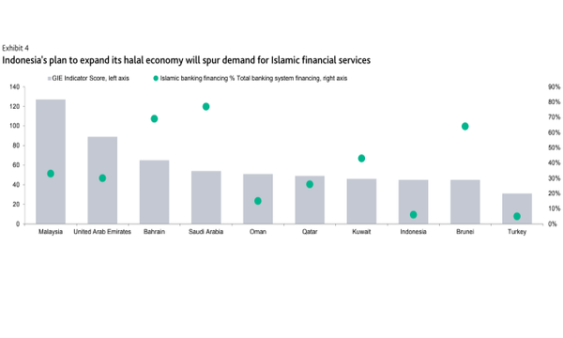
Islamic financing in Indonesia lags Malaysia and Brunei
Government initiatives could boost halal economy and bolster demand for Islamic financial services.
Indonesia still lags behind other Muslim countries in terms of Islamic financing as the country’s Islamic financial services falls to less than 10% of the total share of banking assets, compared to that of neighbouring countries such as Malaysia (around 35%), and Brunei (65%), according to a Moody's report.
Despite this, Moody’s is positive that the government’s recent government initiatives could boost the country’s halal economy and bolster demand for Islamic financial services.
Also read: Malaysia and Indonesia go head-to-head on Islamic banking digitisation
“The Indonesian government is seeking to accelerate the expansion of its halal economy in five years to 2024 by strengthening the value chains of the country's halal industries including SMEs, and by leveraging digitisation to boost production and exports of halal goods. As part of the efforts, it plans to make halal certification mandatory for all consumer products from October 2019,” the report explained.
Moreover, Indonesia is looking to mimic Malaysia’s Islamic banking efforts in the 2000s. “They include making it mandatory to spin off Islamic window operations into standalone subsidiaries by 2024, and allowing Islamic operations to use the existing infrastructure, either physical or digital, of their parent banks,” Moody’s noted.
As of current, Islamic subsidiaries in the country are subject to more stringent regulatory requirements for capital and liquidity than Islamic units or window operations.
Islamic subsidiaries have been able to raise capital to support growth on their own. BRI Syariah, the Islamic subsidiary of Bank Rakyat Indonesia, raised $91.78m (IDR1.3b) in an initial public offering (IPO) in May 2018, whilst Bank Mandiri Syariah, the Islamic subsidiary of Bank Mandiri, plans to go public by 2020.






















 Advertise
Advertise








